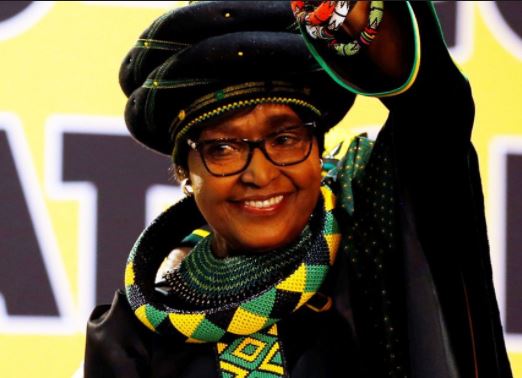
In the long years of nasty apartheid rule in the country, she was a thorn in the flesh of the white supremacists to the extent she was a rallying point in the battle to secure freedom for Nelson Mandela, to whom she was married for over 30 years.
Winnie, as she was fondly called, died at the age of 81 at Netcare Milpark Hospital in the South African capital, as confirmed by her personal assistant, Zodwa Zwane.
The cause of her death was a ‘long-term illness’, according to her family, with The USA Magazine reporting, “Mandela was admitted to the Netcare Milpark Hospital in Johannesburg over the weekend after complaining of the flu. Her spokesperson said in a statement to the state broadcaster that the politician — who also suffered from diabetes and recently underwent several major surgeries — had been in and out of hospital since the start of the year.”
Although her adventures were later tinged with controversies that brought setbacks to her, she dominated the scene and tended to prove that behind the success of every successful incarcerated man, there must be a woman. While many called her ‘Mother of the Nation’, several artistes and writers across the world, who celebrated Nelson Mandela in their works, also accorded Winnie quality attention.
While a poet, simply called Miss Zee, notes of her, “In a time when few men could carry it/You lifted the cross upon your shoulders/Not alone/ Never without a doubt/ You fought for a freedom our birth rights had ordained/Against men who parted seas to claim/ A land that was never theirs,” American writer and activist, Alice Walker, salutes Winnie’s beauty, courage and temperament in a poem she titled Winnie Mandela We Love You.
Walker writes, “Winnie Mandela/We love you. In a time of war/ We love your ferocity./We love your vigilance/We love your impatience/With killers/With charlatans./We love your hatred/Of deaths of our people./We love your hatred of despair.”
Reports quote some politicians and Winnie’s former comrades in struggle as describing her as a heroine. One of such is Fikile Mbalula, a senior member of the African National Congress, who noted that she was a great symbol for the resistance against a brutal government.
In another tribute, South African Minister of Energy, Jeff Radebe, said, “Mama Winnie Mandela was recognised by the people as the Mother of the Nation. As the ANC we dip our banner.”
Even the opposition party mayor of Johannesburg, Herman Mashaba, said she served South Africa with distinction, while the principal of the University of the Witwatersrand in Johannesburg, Adam Habib, described her as the symbol of resistance in the darkest days of apartheid. According to Habib, Winnie provided hope at the critical time.
On the international scene, history records that Winnie spoke against xenophobia, into which South Africa slid after the fall of apartheid, even if not officially. The later part of her life was, however, marred by charges of corruption, violence and kidnapping, on some of which she was convicted.
Strikingly pretty Winnie suffered a rather turbulent love life. While she married Nelson Mandela, the love of her life in 1957, they lived together for only about six years because he was arrested and hauled into protracted jail in 1963. For decades, she had to fight tooth and nail for his release and the fall of apartheid.
The freedom came dramatically in 1990 and got crowned by the election of the husband as the first black President of the country. They, however, later separated and eventually divorced, as she was accused of having extra-marital affairs during the absence of her husband. The parting of ways pained many of their admirers.
As a politician, Winnie Madikizela-Mandela (born Nomzamo Winifred Zanyiwe Madikizela) held several government positions, including as Deputy Minister of Arts, Culture, Science and Technology. A member of the African National Congress party, she served on the ANC’s National Executive Committee and headed its Women’s League.
Born to a Xhosa family in Bizana, she studied social work at the Jan Hofmeyr School. In 1958, she married Nelseon Mandela in Johannesburg and they had two children together. In 1963, Mandela was imprisoned following the Rivonia Trial; where she became his public face during the 27 years he spent in jail. During that period, she rose to prominence within the domestic anti-apartheid movement. She was arrested and detained by state security services on various occasions and spent several months in solitary confinement.
In the 1980s, when she was based in Soweto, Madikizela-Mandela endorsed violent behaviour; including necklacing against alleged police informers and collaborators with the National Party government.
No comments:
Post a Comment
Get more stories like this on our twitter @Abdul_Ent and facebook page @abdulkukublogspot